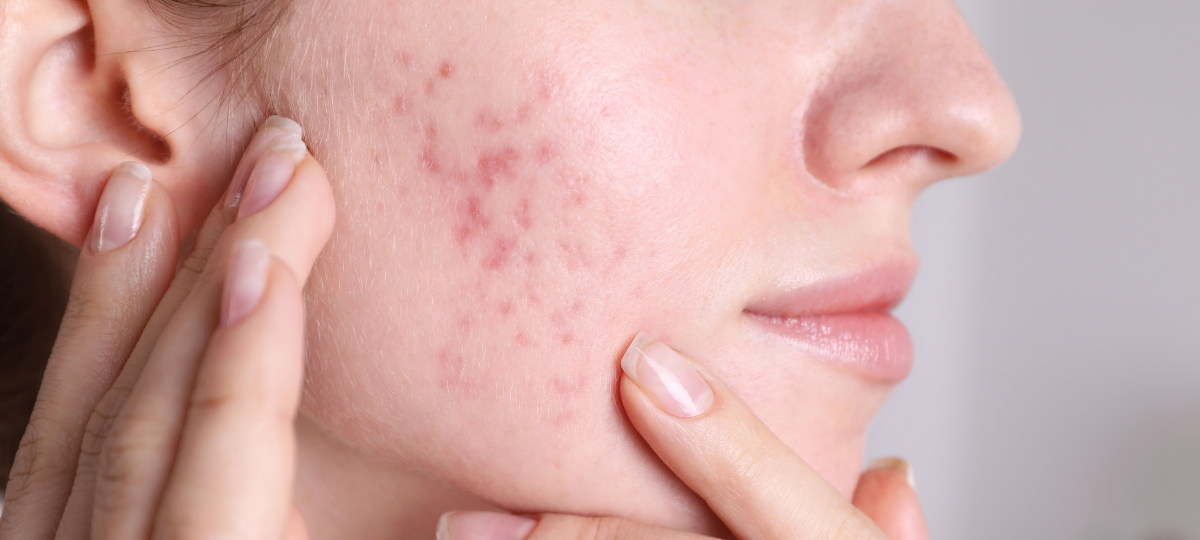Acne isn’t just a teenage issue. Many women continue to experience breakouts well into their 20s, 30s, and even 40s. If you’ve ever wondered why your pimples seem to flare up before your period or around ovulation, hormonal acne might be the culprit. Unlike surface-level breakouts caused by clogged pores, hormonal acne is deeper, more stubborn, and tied directly to fluctuations in hormone levels.d
In this guide, we’ll explore what causes hormonal acne in women, the most common triggers, and natural ways to treat and manage it for clearer, healthier skin.
What Is Hormonal Acne?
Hormonal acne refers to breakouts linked to fluctuations in hormone levels. These breakouts commonly appear on the lower face, jawline, chin, and neck. Unlike whiteheads or blackheads, hormonal acne often presents as painful cysts under the skin.
Common Signs:
- Cystic pimples that are deep and inflamed
- Breakouts in sync with menstrual cycle
- Pimples along the jawline, chin, and neck
- Acne flare-ups during pregnancy, postpartum, or menopause
What Causes Hormonal Acne in Women?
Hormonal acne is often caused by an imbalance in androgens (male hormones like testosterone) which increase sebum (oil) production. This excess oil can clog pores, leading to inflammation and breakouts.
Key Causes:
- Menstrual Cycle: Fluctuating estrogen and progesterone levels before your period can trigger acne.
- Polycystic Ovary Syndrome (PCOS): A common condition that causes elevated androgen levels.
- Pregnancy & Postpartum Hormones: Sudden changes in hormone levels can disrupt the skin’s balance.
- Perimenopause & Menopause: Declining estrogen can result in skin changes and adult acne.
- Chronic Stress: Elevated cortisol levels can aggravate hormonal imbalance.
Triggers That Worsen Hormonal Acne
Even if your hormones are fluctuating, other factors can worsen breakouts:
- Diet high in sugar or dairy
- Lack of sleep
- Poor gut health
- Overuse of harsh skincare products
- Touching your face or not changing pillowcases regularly
Natural Treatment Options
The good news? Hormonal acne can be managed naturally by targeting the root cause and making gentle lifestyle and skincare changes.
1. Balance Your Hormones Naturally
- Seed Cycling: A holistic practice using flax, pumpkin, sesame, and sunflower seeds to support hormone balance.
- Adaptogenic Herbs: Ashwagandha and maca root help regulate cortisol and support adrenal function.
- Diet Adjustments: Eat more omega-3 fatty acids (salmon, chia seeds), fiber, and leafy greens to support hormonal health.
2. Detox Your Skincare Routine
- Use non-comedogenic products
- Choose cleansers with tea tree oil or witch hazel
- Avoid alcohol-based toners that dry out skin
- Look for zinc, niacinamide, and green tea extract in serums
3. Support Your Gut Health
- Take a daily probiotic
- Reduce sugar and processed food intake
- Add fermented foods like yogurt, kefir, and kimchi
4. Try Natural Topical Treatments
- Manuka honey masks: Antibacterial and soothing
- Clay masks (bentonite or French green clay): Help absorb excess oil
- Aloe vera gel: Reduces inflammation and speeds healing
5. Reduce Stress Levels
- Practice yoga or daily meditation
- Prioritize sleep (7-9 hours)
- Journal or take walks to manage emotional stress
When to See a Doctor
If your acne is persistent, painful, or scarring, it’s a good idea to consult a dermatologist or hormone specialist. You may be prescribed:
- Hormonal contraceptives
- Spironolactone (blocks androgens)
- Topical retinoids or antibiotics
For women with PCOS, addressing the root cause with an endocrinologist or gynecologist can provide long-term relief.
Final Thoughts
Hormonal acne can be frustrating, but it’s also a sign that your body is asking for balance. With natural strategies, cleaner skincare, and hormone-friendly habits, you can significantly reduce flare-ups and support overall skin health.
Remember, consistency is key. Healing hormonal acne is a gradual process, but with time, patience, and the right support, clear skin is absolutely achievable.
Want more women’s health and skincare tips? Join the HeySaheli newsletter and embrace your journey to glowing skin, naturally.

